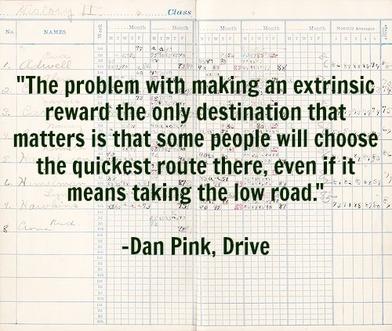 Background Image Credit: Cat Sidh via Flickr. Click on the picture to be taken to the original photo and license. I hear about points a lot. I hear that students won't do something if points aren't handed out. I hear debates about how Common Core skills should be assigned more points than content. I hear about how students should be given points for completing a task because they need to be rewarded for doing their work.
Background Image Credit: Cat Sidh via Flickr. Click on the picture to be taken to the original photo and license. I hear about points a lot. I hear that students won't do something if points aren't handed out. I hear debates about how Common Core skills should be assigned more points than content. I hear about how students should be given points for completing a task because they need to be rewarded for doing their work.I don't agree with any of those reasons for giving students points. In fact, I don't think we should be giving students points in exchange for doing things at all. All it does is promote compliance-and compliance does not lead to innovation. Compliance doesn't make students independent thinkers.
Compliance traps students in a tight little box--and if they try to get out of that box, they are punished with zeroes and other consequences that, really, are all brought about in a futile attempt to improve the math around a students' score rather than improve the student's thinking and learning. This makes students just complete assignments and tasks with a frustrating lack of effort and quality.
As Dan Pink says in his book Drive:
“The problem with making an extrinsic reward the only destination that matters is that some people will choose the quickest route there, even if it means taking the low road."So how do we stop students from taking the low road of task completion for the extrinsic reward of point accumulation?
Start focusing on proficiency rather than points. Start assessing based on how well students have progressed towards mastery of a skill or understanding of concepts. Start having students self-assess on how well they're doing so they can recognize this for themselves and not always rely on a teacher or other outside person to do it for them.
When the focus shifts from points to proficiency, the culture of the classroom starts to shift towards learning and learning how to learn. But you have to hammer the "we do things for learning not points" message from the very beginning, and structure your learning activities around helping students get better at learning concepts and mastering needed skills. You have to give students feedback on where they are on their learning journey and teach them how to internalize that feedback so they can figure out what they know and what they know how to do-and what they need to do to improve. Once the culture of your room starts moving towards getting better at learning, you start to realize that you never needed all those make-believe points at all.
And the next realization you have is that you now have a room full of learners and thinkers and doers and makers.....and potential innovators.
The first thing that has to happen, however, is a shift in our own attitudes. We have to stop viewing learning in terms of points and start helping students get better at learning, to own their own learning. We have to move from points to proficiency.
We have to make learning the only destination that matters.
